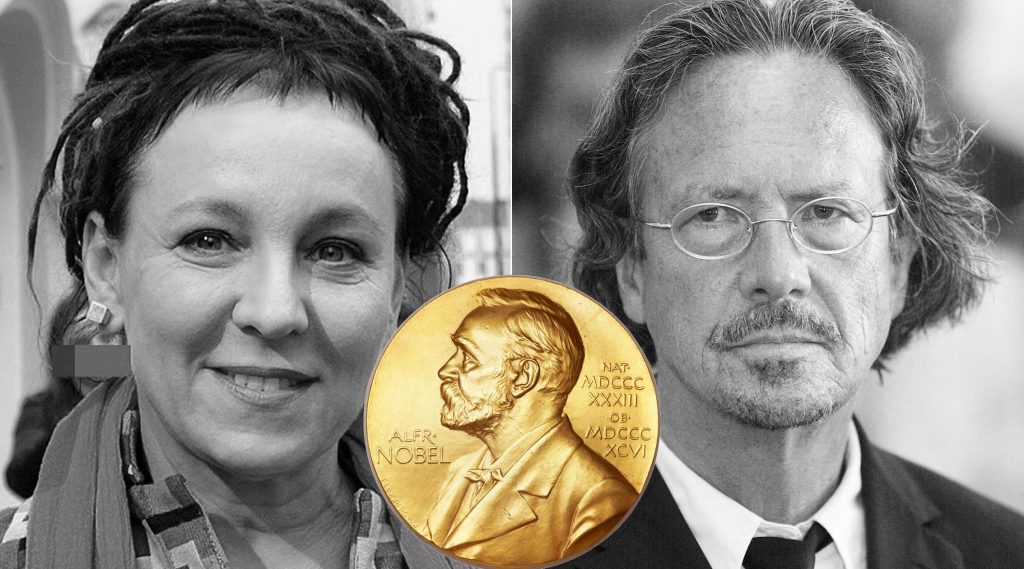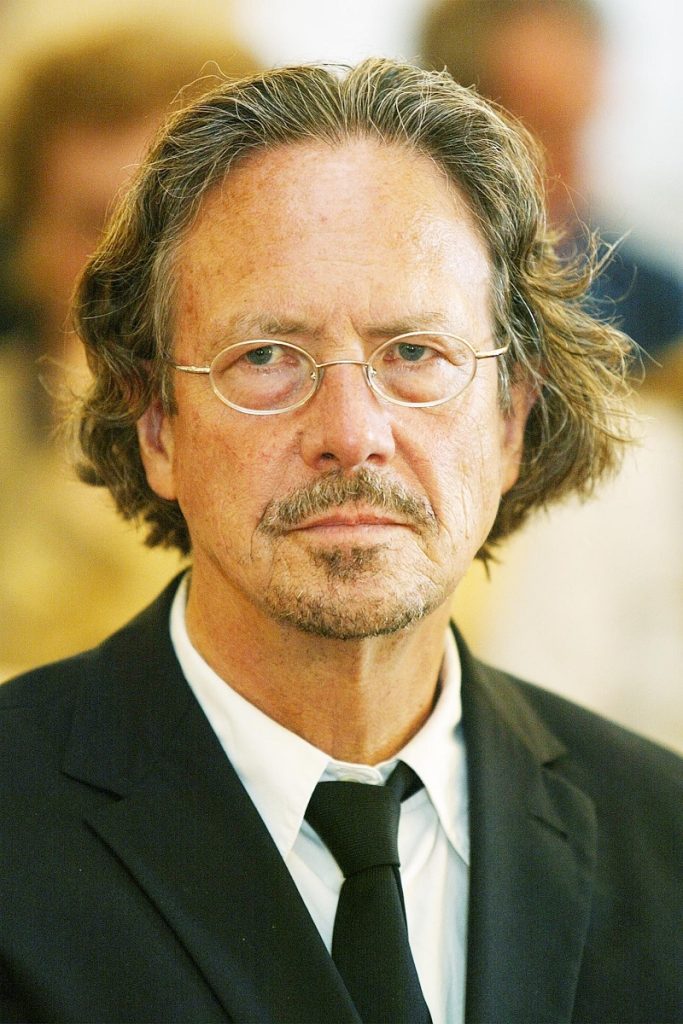Footnotes On Handke’s Nobel Prize, or the Memory of Milošević
When at one o’clock they announced that Peter Handke is also getting the Nobel Prize for Literature, it didn’t take half a minute for, well, not the phone lines, but rather the keyboards under the fingers of the commenters to burn up. Of course until everybody who wrote at least half a page or four lines of poetry doesn’t get this prestigious award, that’s how it’s going to be. Awards are always a great ground for conspiracy theories, furthermore people can start Jew-bashing, Nigger-bashing, gender-based measuring.
If I remember correctly, I personally had nothing particularly against Handke, I even read some good books from him – until around 1996. Because that was the year I came upon two issues from the start of January of Süddetusche Zeitung in a library in Budapest (good old times, I mean library-wise), where they published a shortened version of Handke’s Justice to Serbia, with its much more poetic subtitle: A Winter Journey to the Rivers Danube, Sava, Morava and Drina. It was in itself already a rather strange travelogue, for the title alone. And today, much like in autumn, the four rivers defining, embracing and bordering Serbia (interestingly Tisza was left out), it has become foggy why Serbia needed to get justice at the time?
The text had a quite harsh reception by the time not only among the European, but also the Serbian democratic intellectual circles – what the heck does Handke want? Who, in turn, hearing the reactions, got so fired up, that he even blew off a reading in Berlin.
Handke incidentally visited Serbia not long after the Dayton Agreement, in November of 1995. At first he reported about a bucolic atmosphere: he was welcomed by autumn leaf-fall and silent snowing. But he also reported on his intellectual preparations, as he watched the movie Underground by Kusturica, which had just exploded by that time. That one is in my opinion the apologia of the Great Serbian war politics, and at the same time such an explanation of the Yugoslav Wars for the West, which the West easily bought up, because it was fairly simplified, but understandable: the Balkan people always drink, fuck, and make wars, there is in fact nothing to be understood here, these people are like this, and if we don’t understand ourselves, then you people of the West have even less chance of doing so, so just chill. The main sponsor of the movie was the Serbian State TV, in other words the military propaganda factory of Slobodan Milošević.
Handke was of course also picked up by this television, they adored him, so to speak, just like some other artists of the West and the East, who also had a marvelous time, since they had their asses licked, and it could still be an alternative Nobel Prize to be the official bard of a red-handed regime for a few days. Maybe Eddie Limonov was the most famous of them all, because he even went to Sarajevo, and fired a series of shots into the city.
But something about Handke became suspicious to me. Because he wasn’t the first lunatic yammering about the Serbia of Milošević – let’s just add that the war criminal dictator couldn’t care less about the intellectuals, he didn’t even have home-artists, but of course he didn’t mind either having these minions and beneficiaries like Handke and Kusturica around.
Still, the timing of the article is also very important: the Bosnian war is over, the Croatians got their territories back, from where they frayed the Serbians away, the Dayton Agreement broke out, and Slobo was working on resolving the international sanctions. But it was not yet completely clear what’s happening in Srebrenica, on the other side of Drina, on the Serbian part of which Handke was admiring the scenery, but he also found it exotic that in the totally impoverished country people are selling petrol in plastic bottles, by liters, by the road. Handke didn’t know chalk from cheese, politics from the everyday life. For me his support of Milošević was straight up disgusting, whom at the time they didn’t accuse of war crimes, actually he has so to say the factor (rather guarantee) of the Balkan peace… Politicians of the West were also buddying with him, so why point fingers only at Handke?
But I still didn’t understand what’s going on in his head, I mean apart from the fact that he had a reputation of being a weirdo and an exhibitionist, and in the question about Serbia he even jumped the “new French philosophers” of the time, or anyone who crossed his path; his swashbuckler behavior could have even been sympathetic, because what else should a publicist be like? But I found out from a Zeit interview, that Handke didn’t travel to Serbia alone, but he had his new wife with him: „the Serbian trip, let it sound as absurd as it does, was actually our honeymoon”. Yup, I thought back then, here’s the key: people on their honeymoons – hopefully – see the world in a purple cloud, of course, so Handke could also only see the beauty in the all-dark Serbia, not just because it was autumn, but there was also a frequent power shortage…
So the whole thing was pretty blurred, because Handke started the whole text with stating that those who think of him as being „pro-Serbian” or „yugophile”, should not even start reading. And then cynically, but with a certain elegance, he dealt with Western people who only get their information from the media there, knowing nothing about Serbia (which is, of course, true), but alas he went here, and saw something completely different than what the Western European televisions show. But of course, he somehow forgot to mention that the Yugoslav Wars were often live streamed, especially the actions of the snipers of Sarajevo, but much could be known about the genocides of Zvornik, Srebrenica, etc. as well, just like the outforcement of the Serbians from Croatia. The criticism of the media by Handke could be righteous, but not at all pertinent – the problem was more like that the events were not presented early and effectively enough. From another perspective: they were presented like that, but the audience got bored with seeing the blood of the Balkan in four years.
Handke arrived to Serbia as a sociologist, but unfortunately left as a moral philosopher. He even sympathized with how the police, as they should, fined him for his traffic offense, there are rarely any policeman on the streets of Belgrade anyway – as if that would mean Serbia is not a police state. The petrol situation especially struck a chord with him: „Serbia is the country with the most petrol stations”. (A few years after this it became the country with the most war criminals, and the petrol situation consolidated.) Furthermore, he raised a bunch of questions: who was the aggressor?, who provoked and who fired first?, was it really the Serbs who threw that grenade on the market of Sarajevo? etc.
Handke – as he wrote – didn’t want to blame, but rather question the issues of justice, crime, sin and responsibility. This of course had uneven results, but maybe saying he became the biggest follower of Milošević would be an exaggeration, especially if he knows about the events taking place there a few months before. If he wouldn’t have given it such a provocative title –instead of Justice for Serbia,maybe Petrol Cans on the Roads of Serbia –, not half as many people would have attacked him about it. André Glucksmann, for example, called the author a monomaniac terrorist, and Peter Schneider in Handke’s footsteps contemplated whether now the Serbians of Krajina themselves chased away a hundred thousand Croatians or not (because they did of course). Which fact is a bigger fact? Is factual truth the actual truth? – and so they were philosophizing. But what gave most reason to the outrage was of course Handke’s media criticism, just the part which seemed most correct.
Another question emerged of course by that time: why did Handke become a sympathizer of the Serbs in the ‘90s –his mother was a Carinthian Slovene, so Handke had a slavic bond. It’s just that the Slovenians weren’t exactly fans of Milošević in the ‘90s.
But this is not even the point, because Handke went further on the Serbian path. Because of the Kosovo War, he left the Catholic church and enrolled into the Serbian Orthodox… he visited the – by then, already failed – Serbian leader in Hague, but he also frolicked around on the funeral of Milošević. Because of this, Comédie-Française even took one of his plays off their repertoire, and the old debate was revived. And Handke was explaining himself: he didn’t admire Milošević, but respected him, that’s why he’s been beside him until the end, until his funeral, because he wasn’t even a nationalist, nor a dictator and a Balkan butcher, and he represented the Yugoslavia which Handke admired. (Let’s just add that it was his death that saved Milošević from being judged as a war criminal – because in other cases it was said about other people they partook in the genocide together with him etc.)
But neither then, nor today does this scratch the stimulus-threshold of the – let’s put it this way – liberal opinion-shapers or critics, for he kept getting prestigious awards for his works, and now came the Nobel Prize.
We could list the names of all the writers and artists who were rubbing up against totalitarian regimes and red-handed dictators, in spite of not gaining particularly big advantages from it, but only raising debates at best, provoking the victims, relativizing the crimes, and always denying their own responsibility. Handke is thus only the umpteenth in line, furthermore being a scarcely second-rank writer, this but we believe to be true. Still, it can irritate a lot of people that the Nobel Prize committee, just after their renewal, have already made a decision that is politically quite slippery, though literature-wise less so.
Ha tetszik, amit csinálunk, kérünk, szállj be a finanszírozásunkba, akár csak havi pár euróval!


